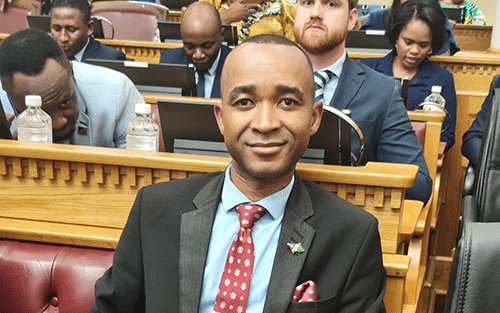Independent Patriots for Change (IPC) Member of Parliament Nelson Kalangula said proper and inclusive consultations were not carried out with the various public transport industry players before a decision to allow seven-seaters to obtain permits for long -distance operations was taken.
Kalangula is IPC’s shadow minister of works and transport.
He asked the country’s works and transport minister Veikko Nekundi to clarify how and when consultations were carried out with all public transport industry players.
He questioned whether or not Nekundi sees the issue of seven-seaters as a contagious topic within the transport sector.
“I rise to ask an urgent oral question to minister of transport , Honourable Nekundi, on whether or not consultations were held with regards to the permits of the seven-seaters.
I have been receiving complaints from taxi drivers and other transport owners who are affected by this decision. As we have all seen, protests by minibus operators and taxi owners have now erupted. The latest one was in Keetmanshoop. Can the minister please clarify if consultations were properly done, and what corrective measure he plans to take?” asked Kalangula.
A few weeks ago, Nekundi announced the decision to lift restrictions on seven-seater drivers, who were barred from operating long distances without permits.
“The seven-seaters will now be permitted officially – no compromise or negotiations.
They will transport seven people as the composition of the car is set up. The current issuance regime has been manipulated to disadvantage the most disadvantaged, the downtrodden, in that a few cliques with no vehicles were issued these licences. They then rent them out at fees ranging from N$500 to N$1 000 a month to the taxi owners. Those with vehicle applications were either turned down or never responded to, despite several follow-ups and appeals,” Nekundi stated in the National Assembly some weeks ago.
However, Kalangula is worried with the brewing tensions amongst public transport operators.
He said some are now feeling disadvantaged by the decision to allow seven-seaters to obtain permits to operate long distances without seemingly having consulted everyone. Looking at the ongoing protests, Kalangula is concerned that the seven-seater decision will create disharmony and unwanted rivalry amongst operators. He said only clear and inclusive consultations will help the matter.
New regime
Nekundi clarified that all holders of indefinite passenger permits (taxi, bus and tour operator permits) have until 30 September 2025 to convert them into two-year renewable permits.
To curb and address these abnormalities, permits will now only be issued in favour of persons who present vehicles intended to be used to transport passengers. Permits will be issued in the name of the owner and the vehicle so designated.
However, those renting will be required to apply within the period ending 30 September 2025.
They will continue to use such rented permits until they are issued with their own two-year transitional permits.
The requirements to convert the indefinite permits to the two-year transitional period are the original permit, a valid motor-vehicle licence, a certificate of registration of the vehicle, and a certified copy of an identity document.
The process to apply for the new permits in relinquishing the rented permits and acquiring a new permit as a new operator is receipt of applications, submission for publication in the Government Gazette, public objection period (21 days) as well as board adjudication and finalisation of decisions. The total duration is approximately four to five months. Nekundi said his ministry is committed to ensuring that Namibia’s regulatory systems are responsive, efficient and supportive of a well-functioning transport sector.
– ohembapu@nepc.com.na


